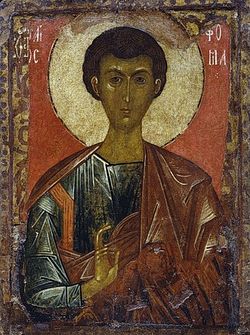Belief in the great miracle of the Resurrection did not come to the disciples right away. The first witnesses were the myrrh-bearing women. It was still dark out when they came to the cave in the garden belonging to Joseph of Arimathea. The stone which had sealed the tomb was now rolled away. While they stood in astonishment, an Angel stood before them and said, Fear not ye: for I know that ye seek Jesus, which was crucified. He is not here: for he is risen, as he said. Come, see the place where the Lord lay (Mt. 28:5–6). It was enough for them to see the empty tomb and hear the words of the Angel in order for them to believe. Their sensitive and loving hearts were not touched by doubt. When they ran to tell the Apostles, Jesus Himself met them and said, All hail. And they came and held him by the feet, and worshipped him (Mt. 28:9). The Apostles did not believe the women (cf. Mk. 16:11).
On the same day, when evening had come, Jesus revealed the great mystery of His Resurrection to two more disciples (Luke and Cleopa, Apostles of the Seventy), who were walking to Emmaus, which was from Jerusalem about threescore furlongs (11.5 km. or 7.15 miles) (Lk. 24:13). To make them believe in the Resurrection of their Teacher, Jesus cited the messianic prophecies from the Scriptures (cf. Lk. 24:27). Nevertheless, they only fully believed after He showed the sacrament of the Eucharist: And it came to pass, as he sat at meat with them, he took bread, and blessed it, and brake, and gave to them. And their eyes were opened, and they knew him; and he vanished out of their sight (Lk. 24:30–31). Luke and Cleopa returned that same day to Jerusalem and told the Apostles what had happened, but they didn’t believe them, just as they did not believe the myrrh-bearing women. Late that evening, Jesus appeared to the Apostles, who had gathered behind locked doors, out of fear of the Jews. The Savior passed through the closed doors. In this was shown a particular quality of the Lord’s body, which was transformed after the Resurrection, and no longer subject to the laws of the physical world. Jesus could pass through material objects. The disciples were perplexed, because they thought that they had seen a spirit. He shewed unto them his hands and his side (Jn. 20:20). This was important not only in order to convince them that He had bodily appeared to them, but in order to vanquish their unbelief. The Lord allowed them to touch His hands, feet, and side. The wounds from the nails proved to them that this was the same body that had been crucified on the Cross.
The events to which Antipascha is dedicated took place on the eighth day after the Resurrection. The Apostle Thomas was not present at the Savior’s first appearance to the disciples. Apparently, he was not in town. The Apostles whom Thomas then met joyfully announced their Teacher’s Resurrection to him. It can be supposed that they also related to him how Jesus had allowed them to touch His feet, hands, and side. Thus, his own desire for this is understandable: Except I shall see in his hands the print of the nails, and put my finger into the print of the nails, and thrust my hand into his side, I will not believe (Jn. 20:25). The Apostle Thomas’s unbelief has nothing to do with the hardened unreceptiveness that we see in the Jewish leaders toward the miracle of the Resurrection. This was a perfectly natural wish to confirm his faith through a manifest and obvious testimony. The Resurrected Jesus renewed His appearance to the Apostles on the eighth day, standing before them in the chamber where the doors where closed. He answered the Apostle Thomas’ doubt with the same words that Thomas had used to express it. This could not but have amazed the doubting disciple: Reach hither thy finger, and behold my hands; and reach hither thy hand, and thrust it into my side: and be not faithless, but believing (Jn. 20:27). This is probably the reason why Thomas did not make use of his Teacher’s invitation to touch His hands, feet, and side, but rather believed immediately and confessed Jesus Christ as God: My LORD and my God (Jn. 20:28)! People who stubbornly reject the divinity of the Savior of the world, pass over this passage in the Gospels.
The first week after Pascha is called Renewal week,
or the week of Antipascha (the Greek prefix,
anti, means “in place of”)—that
is, the renewal of Pascha. On this Sunday, the Lord
repeated and renewed for all eleven of the Apostles
His appearance on the first day after the Resurrection.
But because the renewal of the Savior’s appearance
was especially for the sake of the Apostle Thomas, the
eighth day after Pascha is called Thomas Sunday. Following
directly after the Paschal week, it completes the most
solemn part of the great feast. Therefore, Thomas Sunday
is sometimes called the eighth day after Pascha.
St. Gregory the Theologian writes, “The law of
honoring the day of renewal is ancient and of good
intent; or it would be better to say, to honor with the
day of renewal a new act of goodness. But was not the
first day of Resurrection, the Sunday which followed the
holy and light-bearing night, the day of renewal? Why is
that name given to the present day? That day was the day
of salvation, and this day is the day of remembrance of
salvation” (Homily 44, on the Sunday of
Renewal).




